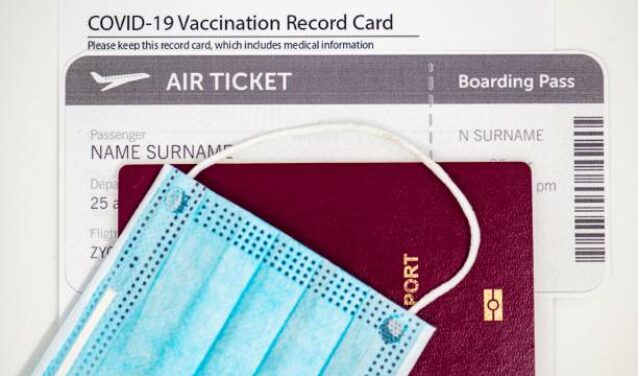Since May 2021, the borders are gradually opening. The epidemic situation is stabilising in several countries, with the measures taken by governments, but also thanks to the arrival of vaccination. By March 2020, the confinements, deconfinements and border closures had made it more difficult to travel to tourist destinations and second homes. Only business trips or compelling reasons were used as exemptions to leave the territory. The health crisis had a strong impact on the commercial and business aviation sector. The hope of a return to travel is now possible with the health pass, as shown by the increase in private jet bookings over the past month. “PCR test”, “vaccination” and “recent contamination” are terms often mentioned when preparing a pass. However, this wealth of information can be a grey area for travellers.
What constitutes a health pass ?
How do I get a health pass to fly in a private jet this summer ?
First of all, we need to distinguish between two health passes: one, implemented on a national scale in France, and the second, implemented with the European Union, which will come into force on 1 July.
In concrete terms, in order to cross borders and be able to travel, anyone who has a health pass will only have to present it in digital form, directly on the TousAntiCovid application, but also in paper form.
What are the conditions for obtaining a health pass?
- Vaccination certificate : this is obtained when an individual has received their last dose of vaccine and has waited the necessary incubation time after this. Indeed, if a person has proof that he or she has recently tested positive for COVID-19, one dose is sufficient. Otherwise, each person should receive two doses. Also, depending on the vaccine injected, the incubation time after the last dose varies. It may take two to four weeks before you are considered fully vaccinated. Lastly, you have to take into account the wait between the first and second injection, which is about one month. Two to three months are therefore necessary before being fully vaccinated.
- Proof of a negative RT-PCR or antigenic test : this test must be less than 48 hours old to be able to travel to an event or 72 hours old for a sanitary border control. For example, for a one-week trip abroad, a first PCR test must therefore be carried out on entering the destination country and a second on leaving. Please note that PCR tests are not free abroad.
- A positive RT-PCR or antigenic test proving the cure of COVID-19, dating from 15 days to 6 months. Indeed, after an infection, antibodies are still present allowing a temporary immunity to the person positive to the test.
Finally, all countries were classified according to the spread of the virus on their territory, using three colours: green, orange and red.
- Green zone: low risk of infection.
- Orange zone: moderately increased risk area.
- Red zone: high risk of infection.
The conditions for entering and leaving a country therefore vary according to the zone.
Which destinations are preferred with the health pass in view of the explosion in demand ?
Despite the pass, each country is free to impose its own conditions. It is therefore essential to find out regularly which destination to choose.
To go to Corsica :
- Negative PCR test less than 72 hours old
OR an antagonistic test less than 48 hours old
OR proof of full vaccination
- A sworn statement that you have no symptoms
No test is required to travel to the mainland from Corsica.
To discover Italy :
- Negative PCR or antigenic test less than 48 hours old, even for people vaccinated or already cured of COVID-19.
If a person does not have a PCR test when travelling, they will have to undergo a 10-day quarantine
Travellers exempt from testing:
- Travel of less than 120 hours for work, health or absolute emergency reasons.
- Passengers travelling to San Marino or the Vatican
- Transit, by private travel, for less than 36 hours
- Border workers
- Employees of companies and institutions with a main or secondary office in Italy for trips outside the country for professional reasons of less than 120 hours
- Members of the European Union, of an international organisation or during a diplomatic mission
- Military and law enforcement personnel
- Pupils and students attending school in a country other than their state of residence, home or stay, to which they return daily or at least once a week.
- Crew of means of transport
- Children under the age of two.
- Complete a form (EU PLF)
- Report to the regional health authorities on arrival
For Portugal :
- Negative test less than 72 hours old (except children under 2 years)
OR an antigenic test (NAAT, TRAg), less than 24 hours old and performed by a laboratory (for all persons over 2 years old)
To go to Spain:
- Negative PCR test or an antigenic test less than 48 hours old from 6 years old
OR a complete vaccination certificate
OR a certificate of recovery of COVID-19 (within 180 days of the 1st positive test)
Travellers exempt from testing:
- Children under 6 years of age
- Travellers with air connections
- Crews of international means of transport for professional reasons as well as road transport professionals
- Border residents within a 30 km radius of their place of residence
- A personal form (Spain Travel Health) must also be completed
For travel to Greece :
- Negative PCR test less than 72 hours old from 6 years old
OR a certificate of full vaccination
OR a certificate of recovery from COVID-19 between 2 and 9 months after infection
The local authorities may carry out random tests on entry. If positive, a 10-day quarantine (or 7 days for vaccinated persons) must be carried out.
- Complete a Passenger Locator Form, less than 24 hours before arrival
To travel in Switzerland :
- Negative PCR test less than 72 hours old from 16 years old
OR proof of full vaccination
OR a certificate of post-infection immunity
Exception for passengers arriving from France to Mulhouse and Basel, if they are leaving on the French side of the border.
- If you are coming from a risk area, you must carry out a ten-day quarantine on arrival for people over 16 years old.
In addition, you must declare yourself within two days to the competent cantonal authorities.
Travel exempt from quarantine and testing :
- Cured persons, for a period of 6 months
- People who have been vaccinated for a period of 6 months with one of the vaccines authorised by Switzerland or the European Medicines Agency.
- Children under 16 years of age
These exceptions are not granted to persons coming from a country with a high risk of infection or a significant evolution due to the COVID-19 mutation
- Persons in transit for less than 24 hours
To benefit from an exemption by air, the passenger must not have left the airport
- Travellers must complete a form
For all other countries outside of Europe, it is necessary to contact the embassies to find out if the country allows tourists and under what conditions.
Concerning the United States :
Going to the US from the Schengen area:
- Negative PCR test less than 72 hours old
OR certificate of post-infection immunity
- Presentation of a form
- Presentation of a visa or additional documents if the person cannot present a passport in biometric format.
- Have a travel authorization (ESTA). This document is not required for people with a visa or visa waiver.
- Restrictions on entry (see Presidential Proclamation)
For exceptions, contact: parisvisainquiry@state.gov
Travelling to the Schengen area from the USA :
- Certificate of full vaccination with one of the approved vaccines
OR a negative PCR or antigen test (TAG) less than 72 hours old (minimum age differs depending on the country you are travelling to)
- Presentation of an international travel certificate
- Have the derogatory travel certificate and proof of business travel), not necessary if the passenger is fully vaccinated.
Exempted travellers:
- Business emergency where it is impossible to carry out a test due to lack of time.
For the UK :
Going to the UK from the Schengen area:
- PCR or antigenic test (respecting a specificity threshold of 97% and sensitivity of 80%) within 72 hours from the age of 11 years for England and Scotland
- Presentation of a document (Passenger locator form), 48 hours before departure
Exceptions:
- Civil servants and contractors working on essential security duties at UK borders
- Workers on the Channel Tunnel system
- Defence personnel
- Visiting forces and government contractors
- Members of diplomatic missions and consular posts in the UK
- Representatives of international organisations
- Representatives to an international or UK conference of privileges and immunities, and their families or dependants
- Representatives of a foreign country or territory or British Overseas Territory
Countries are classified in three colours according to virus circulation:
- red (high presence of COVID-19)
- amber (moderate)
- green (low)
When the country is classified as amber, a 10-day quarantine must be carried out and a reservation made.
Passengers who have travelled or transited from a country classified as red, less than 10 days ago, cannot travel to the UK except :
- EEA nationals with permanent right of residence in the UK or with EU Settlement Scheme (EUSS) leave
- EEA minor nationals
- Passengers resident in the UK
- Crew members
- Transit passengers provided they do not leave the international transit area
- Medical staff employed by the NHS
- Passengers carrying human cells or blood
10 days on arrival in a government-approved managed quarantine hotel, at their own expense, if the passenger has travelled to or transited through one of the red-listed countries in the last 10 days.
Travelling to the Schengen area from the UK :
- PCR or antigen test less than 48 hours old (minimum age differs depending on the country you are travelling to)
- Sworn Statement stating that the passenger does not have COVID-19
- Compelling reason may be required for certain categories of persons
- 10-day isolation period with proof of residence in the place of quarantine. This period is 7 days for vaccinated persons.
Morocco has set up two lists :
List A: members of the European Union and Moroccans
- A negative PCR test less than 48 hours old for all persons over 11 years old
OR a total vaccination of more than four weeks, by one of the vaccines recognised by the WHO. - Submission of the Public Health Passenger Form
List B: apply for authorisation in Morocco
- PCR test less than 48 hours old
- Isolation of 10 days on site
For Algeria :
- Negative PCR test of less than 36 hours for travellers over 10 years old
- Once in the country, a 5-day quarantine is imposed (at the traveller’s expense), which can be renewed if the PCR test is positive after this period.
- Departures from France are highly regulated, so you must have a valid reason proposed on the form to be filled in:
- Residence permit
- Entry permit
- Visa
- Laissez-Passer
- Work permit
With the generalization of the health pass in Europe, the desire for a change of scenery has led to a strong increase in demand for private jets this summer. After a difficult year, it seems that people have not given up on their holidays !
Our aviation experts are at your disposal 24/7 for your private flight at +33 (0) 1 44 09 91 82. Don’t hesitate to visit our online quote to obtain a price estimate for your private flight.






